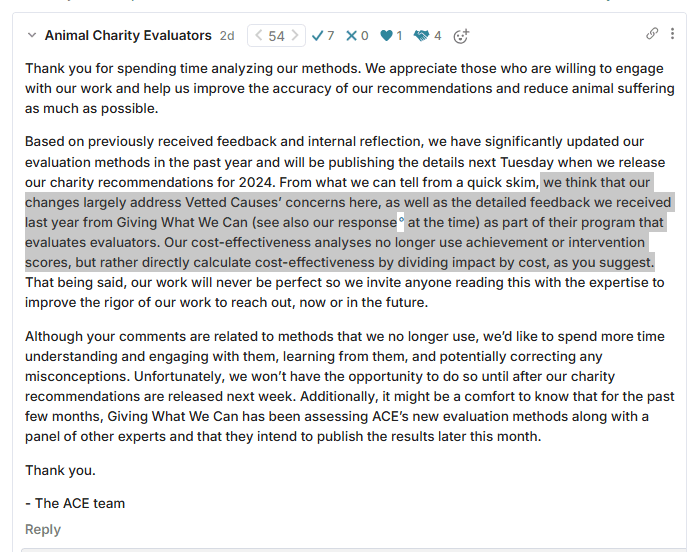Hi everyone,
Recently, I decided to read one of ACE’s charity evaluations in detail, and I was extremely disappointed with what I read. I felt that ACE's charity evaluation was long and wordy, but said very little.
Upon further investigation, I realized that ACE’s methodology for evaluating charities often rates charities more cost-effective for spending more money to achieve the exact same results. This rewards charities for being inefficient, and punishes them for being efficient.
ACE’s poor evaluation process leads to ineffective charities receiving recommendations, and many animals are suffering as a result. After realizing this, I decided to start a new charity evaluator for animal charities called Vetted Causes. We wrote our first charity evaluation assessing ACE, and you can read it by clicking the attached link.
Best,
Isaac




I don't find that evidence particularly compelling on its own, no. Lots of projects cost more than 1M or take more than a few years to have success. I don't see why those things would be cause to dismiss a project out of hand. I don't really buy social movement theories of change for animal advocacy, but many people do, and it just seems like many social movement-y things take a long time to build momentum, and legal and research-focused projects take forever to play out. Things I'd want to look at to form a view on this (though to be clear, I plausibly agree with you!):
I don't think we disagree that much here, except how much these things matter — I don't really care about ACE's ability to analyze cost-effectiveness outside broad strokes because I think the primary benefits of organizations like ACE is shifting money to more cost-effective things within the animal space, which I do believe ACE does. I also don't mind ACE endorsing speculative bets that don't pay off — I think there are many things that were worth paying for in expectation that don't end up helping any animals, and will continue to be, because we don't really know very many effective ways to help animals so the information value of trying new things is high.
But to answer your question specifically, I'd be very skeptical of anyone's numbers on future cost-effectiveness, ACE's or yours or my own, because I think this is an issue that has historically been extremely difficult to estimate cost-effectiveness for. I'm not convinced that's the right way to approach identifying effective animal interventions, in part because it is so hard to do well. I don't really think ACE is making cost-effectiveness estimates here though - it seems much more like trying to get a rough sense of relative cost-effectiveness, which, putting aside the methodological issues you've raised, seems like the right approach to me, but only a small part of the information I'd want to know where money should move in animal advocacy.